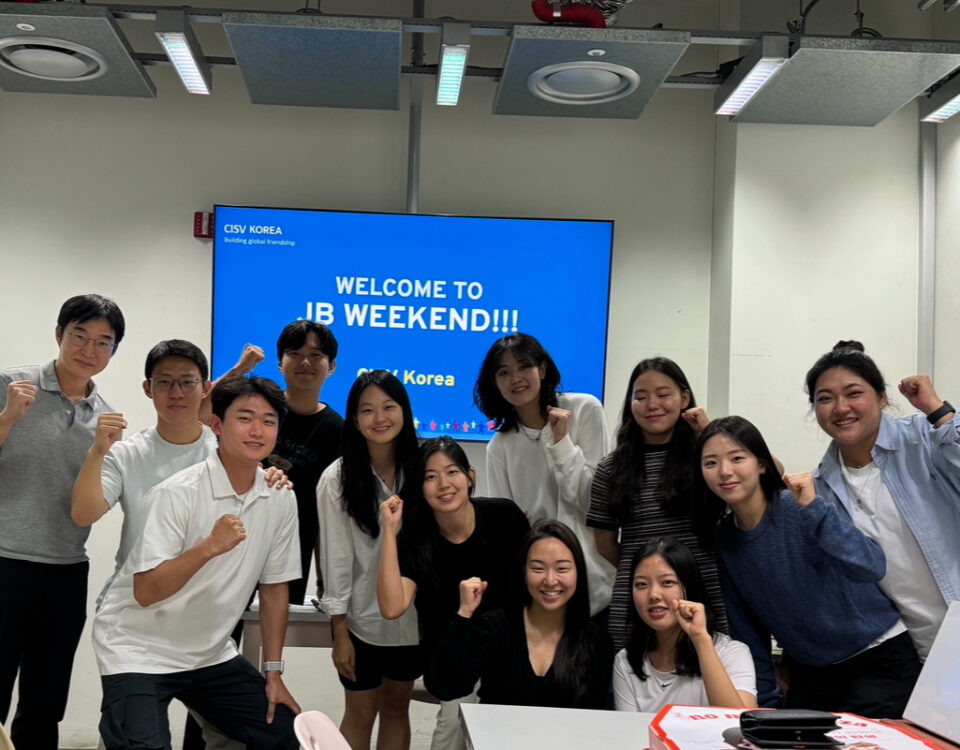
Teaching Children the Art of Peace
September 21, 2024
Positive change in CISV Korea Junior Branch
November 2, 2024Human rights are the foundation of a just and equitable society. Educating children about their rights and the rights of others fosters a sense of justice and equality. By integrating human rights education into school curriculums, we can empower the next generation to stand up for their rights and the rights of others.
What can you do to build a just world?
- Educate Yourself and Others About Human Rights: Learn about fundamental human rights and share this knowledge with others. Read the UN Declaration of Human Rights and use resources like books, online courses, and workshops to deepen your understanding of how human rights work and its current state around the world.
Every day is an opportunity to learn about human rights and engage those around us in the topic. Even if we do not remember the concept or words “human rights”, we encounter them through our daily lived experiences. Some of the most newsworthy events are those where human rights are violated. Human rights are everyone’s responsibility, and it is our collective duty to protect each other’s rights and freedoms.
- Advocate for Human Rights Education in Schools: Encourage local schools to incorporate human rights education into their curriculum. Offer to volunteer or provide resources to support this initiative.
Schools also give children an avenue to practice upholding the rights of others. By fostering positive interactions between students, they develop good values and behaviors conducive to respecting human rights early on so they can carry these with them as they grow older.
Personally, service-learning programs have played an important role in forming the mindset I have today. I was fortunate enough to have gone to schools with strong programs, which further exposed me to human rights violations up close and ultimately influenced my choice to pursue a career in the development sector. Human rights education through unique formats like service-learning can leave a lasting impression on students and positively influence their interactions with different people in the future.
Support Organizations That Promote Human Rights: Donate to or volunteer with organizations that work to protect and promote human rights. Your support can help these organizations reach more people and make a greater impact.
I work for a non-profit organization that provides water, sanitation, and hygiene access to communities in the Philippines. My favorite part of the job is engaging our donors in our cause; we often bring them with us during project implementations so they can meet families that would benefit from their donation. While monetary donations are important to our mission, it’s engagements like these that remind me of our shared humanity and prompts me to reflect on my own lifestyle and how society works to some people’s benefit more than others.
Supporting organizations working towards human rights gives us an avenue to practice our duty to uphold each other’s rights in solidarity with others. Encourage your family and friends to join you in this endeavor by volunteering, raising funds, or spreading awareness together – it makes for a meaningful bonding experience too!
Human rights as the basis for peace
Peace can only take place when people’s rights are upheld and respected. Since 1951, CISV has been working towards the promotion of human rights as part of our peace education framework. Through our programmes, we teach participants about their rights and the importance of respecting the rights of others through activities such as discussions, role-playing, and interactive sessions.
The Junior Branch provides an avenue for participants to apply what they have learned in programmes outside the camp setting. By organizing Mosaics like campaigns, fundraisers, and similar projects that raise awareness and help address barriers to the realization of human rights, we ensure that the knowledge people gain from joining programmes does not remain stagnant but is used for meaningful activities that contribute towards peace in our communities.
We also ensure that all our activities are conducted in a safe and inclusive environment where participants feel respected and valued. This allows for open and respectful dialogue about human rights issues. True to our motto of building global friendship, we ensure participants build rapport first with one another before delving into topics like human rights, especially considering their cultural context and beliefs. We find it important to hold space for participants as they go through the learning process, which entails being fully present when they share their opinions, withholding judgment towards their views, and taking steps to understand where they are coming from.
There is much to be done still as many people’s rights are still being violated today’s society. CISV is a unique platform for education and action, and I invite my fellow CISVers to reflect on how we can continue utilizing this platform to promote human rights in our organization and in our own communities.
By Lianna Cabigas, International Junior Branch Team Member



